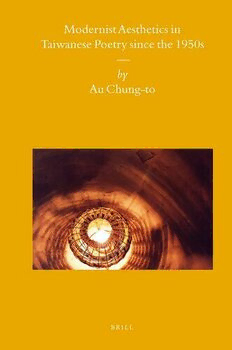
Modernist Aesthetics in Taiwanese Poetry Since the 1950s PDF
Preview Modernist Aesthetics in Taiwanese Poetry Since the 1950s
Modernist Aesthetics in Taiwanese Poetry since the 1950s Sinica Leidensia Edited by Barend J. ter Haar In co-operation with P.K. Bol, D.R. Knechtges, E.S. Rawski, W.L. Idema, E. Zürcher, H.T. Zurndorfer VOLUME 85 Modernist Aesthetics in Taiwanese Poetry since the 1950s By Au Chung-to LEIDEN • BOSTON 2008 Cover illustration: Another view of the ‘food-steamer lamp’. Photo courtesy of Ivan Chan. Th is book is printed on acid-free paper. Library of Congress Cataloging-in-Publication Data Au, Chung-to. Modernist aesthetics in Taiwanese poetry since the 1950s / By Au Chung-to. p. cm. — (Sinica leidensia ; v. 85) Includes bibliographical references and index. ISBN 978-90-04-16707-0 (alk. paper) 1. Chinese poetry—Taiwan—History and criticism. 2. Chinese poetry—20th century—History and criticism. I. Title. PL3031.T3A86 2008 895.1’15209951249—dc22 2008009746 ISSN 0169-9563 ISBN 978 90 04 16707 0 Copyright 2008 by Koninklijke Brill NV, Leiden, Th e Netherlands. Koninklijke Brill NV incorporates the imprints Brill, Hotei Publishing, IDC Publishers, Martinus Nijhoff Publishers and VSP. All rights reserved. No part of this publication may be reproduced, translated, stored in a retrieval system, or transmitted in any form or by any means, electronic, mechanical, photocopying, recording or otherwise, without prior written permission from the publisher. Authorization to photocopy items for internal or personal use is granted by Koninklijke Brill NV provided that the appropriate fees are paid directly to Th e Copyright Clearance Center, 222 Rosewood Drive, Suite 910, Danvers, MA 01923, USA. Fees are subject to change. printed in the netherlands For Th eo CONTENTS Acknowledgements ............................................................................ ix List of Illustrations ............................................................................. xi Notes on Translation and Spelling .................................................. xiii Chapter One Introduction ............................................................ 1 ‘Place’ and ‘Placelessness’ ............................................................. 7 Th e Mutable and the Immutable ................................................ 8 Th e Poetic Space ............................................................................ 16 Taiwanese Modernist Aesthetics ................................................. 18 Chapter Two Unhomely Houses .................................................. 27 ‘Homely’ and ‘Unhomely’ ............................................................. 28 Buried Alive .................................................................................... 33 Transparent Space .......................................................................... 35 Th e Dark Space .............................................................................. 47 Th e Window as an Opening to the Public Realm ................... 55 Chapter Th ree Imagining Taipei .................................................. 61 Modernism in Imagination .......................................................... 62 Th e Unreal City ............................................................................. 64 Th e Disappearance of the Crowd ............................................... 67 An Invisible Persona ..................................................................... 71 Th e Urban Uncanny ...................................................................... 79 Gender Space ................................................................................. 82 Estrangement .................................................................................. 89 Chapter Four Homelands as Shift ing Ground ........................... 101 Yearning for the Lost Origin ....................................................... 104 Quest for a Mythic Origin ........................................................... 110 Searching for a Cultural Identity ................................................ 114 Th e Uncanniness of Homecoming ............................................. 124 Traveling as Collecting of One’s Identity .................................. 129 Making Exile His Homeland ....................................................... 132 Th e Origin is a Shift ing Ground ................................................. 134 Finding Stability in Instability ..................................................... 139 viii contents Chapter Five Imagined Literary Community: Language, Memory and Nature ...................................................................... 141 Horizontal Comradeship .............................................................. 145 Vertical Comradeship ................................................................... 147 Language as Home ........................................................................ 148 Fabricating Memories ................................................................... 157 Return to Nature ............................................................................ 175 Homeland (Re)located .................................................................. 190 Chapter Six Conclusion ................................................................. 193 Bibliography ........................................................................................ 197 Index .................................................................................................... 203 ACKNOWLEDGEMENTS Th is book is full of beauty. Th is is not only because the subject of my discussion is poetry or aesthetics. It is rather also because of the people I met or worked with during these years. I wish I could include all their names here. For those names I have omitted, I will never forget you or your contributions. My fi rst thanks go to Professor Esther Cheung (University of Hong Kong). Her criticisms on draft s of this book drove me in a direction I never dreamed of, or had feared to tread. Nevertheless, I am more hap- pily at home there now. Although the ideas she introduced to me some- times drove me crazy, most of the time, I was intoxicated by them. However, it is Professor Tom Rendall (Peking University) who really saw me embark on this intellectual journey when I was an undergraduate student. He not only taught me to appreciate the beauty of English, by extension, but also of Chinese literature. His trenchant comments and queries helped to better structure the book and made it more readable. His graciousness and concern have been a moral support. My thanks also go to the poetic couple Lomen and Rong Zi, who invited me to visit their ‘House of Light’ in Taipei. I will never forget the time and thoughts we shared together. Above all, the publication of this book would not have been possible without the generous support and assistance of Professor Ngai Ling Tun (Chinese University of Hong Kong) and Lucy Moore. Finally, I express heartfelt thanks to my family for their support; without them, I could not have completed this project.
